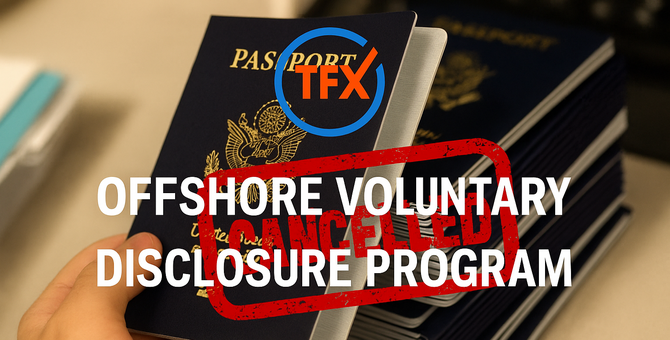Delinquent FBAR submission procedures – 2026 guide

Many expats only realize after the fact that their foreign bank accounts should have been reported to the IRS through an FBAR filing. The Delinquent FBAR Submission Procedures (DFSP) give a clear, IRS-approved route in 2025 for catching up on these past-due FBARs and restoring full compliance without unnecessary penalties.
This guide explains what the process involves, how it aligns with FinCEN rules on foreign account reporting, and the simple steps to fix missed FBARs confidently and efficiently.
This article is brought to you by Taxes for Expats – the trusted team ensuring smooth IRS compliance for expats. Our experts have helped thousands of US citizens abroad navigate DFSP and other filing programs with accuracy and peace of mind. We follow official FinCEN guidance to make compliance simple – learn more about our services or contact us today to get started.
FBAR basics and who must file it in 2025
Picture an American living overseas who keeps savings in a local bank. Everything seems fine until tax season arrives and they hear about an extra filing called the FBAR. That’s when questions start – what is FBAR, who files it, and how it fits into the yearly tax routine.
FBAR, short for the Report of Foreign Bank and Financial Accounts, is filed electronically as FinCEN Form 114 under the Bank Secrecy Act. It lets the Treasury track each foreign financial account held by individuals, corporations, or entities linked to the United States. The report focuses on transparency, not taxation, and covers accounts like bank deposits, brokerage accounts, and some foreign pensions.
Knowing what an FBAR means is not sufficient to know if you should be among the prospective filers. Under the FinCEN rules, those who must file FBAR are:
- US persons abroad who hold or control financial accounts outside the United States.
- Citizens and residents with signature authority over a qualifying account, even if they do not own the funds.
- Businesses, trusts, and estates considered United States persons under Treasury rules.
FBAR reporting thresholds in 2025
The FBAR reporting threshold remains an aggregate value of $10,000 or more at any point during the year. This $10,000 threshold applies to the combined highest balances of all accounts. The filing deadline is April 15, with an automatic extension to October 15 – no special request needed.
FBAR late filing penalties (Non-willful vs. willful)
In Bittner v United States, the Supreme Court held that a nonwillful FBAR violation is penalized per annual report, not per account. Another guiding case, Bedrosian v United States, confirmed that willfulness can include reckless disregard of the filing duty. These judicial precedents define how intent shapes the outcome of an FBAR late filing penalty and how the IRS applies its enforcement discretion under the FBAR statute of limitations, which generally carries a 6-year limit for civil assessments.
Think of willful vs non-willful as the dividing line that sets the ceiling of exposure. The IRM and case law treat willfulness to include knowledge or reckless disregard, while nonwillful conduct reflects negligence, inadvertence, or a good-faith misunderstanding.
When the IRS asserts an FBAR late filing penalty, the 2025 caps are up to $16,536 per nonwillful report and the greater of $165,353 or 50 percent of the account balance for willful violations. These amounts apply to penalties assessed on or after January 17, 2025. Separate from FBAR, some compliance tracks include Title 26 miscellaneous offshore penalties, such as the 5 percent amount in the streamlined domestic procedures.

FBAR statute of limitations and penalty periods
IRS classifies FBAR violations as nonwillful or willful, and that choice controls the maximum penalty. Civil FBAR assessments generally must occur within six years of the FBAR due date under 31 U.S.C. 5321(b)(1). These same windows shape how many years are typically addressed when fixing past filings.
| Violation | Max penalty | Typical outcome |
|---|---|---|
| Nonwillful late filing | Up to 16,536 per report | Often resolved with warning or no penalty when the DFSP criteria are met |
| Willful late filing | Greater of 165,353 or 50% of account balance | Exams and Appeals apply mitigation guidelines and may assert multi-year penalties |
| Late filing cured under DFSP | Generally none assessed | IRS generally does not impose a penalty when income was properly reported and other DFSP conditions are met |
Late filing penalties can feel brutal in real life, especially when a simple mistake snowballs. The US tax system is not out to punish honest errors, which is why reasonable cause, penalty mitigation, and even penalty abatement may apply when the facts support relief.
What is the 2025 due date for FBAR filing?
At the risk of being redundant, little things like deadlines tend to go unnoticed until they sneak up on you. FBAR due date is one of those details that seems minor – until the calendar turns and it’s suddenly urgent.
The April 15 deadline is the official due date for reporting 2024 foreign accounts under the Bank Secrecy Act. Reports must be submitted through the BSA e-filing system, where the process includes an in-built FBAR filing extension feature that automatically covers the extended deadline.
NOTE! There is an October 15 automatic extension, which applies to all filers without the need to submit any extra forms.
What are delinquent FBAR submission procedures?
Missing FBARs can cause a wave of panic, especially after your income was already reported. Take a breath and relax. While the penalties can look overwhelming, the IRS has made room for understanding through the DFSP – a process built to help taxpayers catch up safely by giving acceptable reasons for filing their FBAR late.
Before checking if you meet the criteria or qualification, it helps to understand what the delinquent FBAR submission procedures are. The DFSP is a simple IRS program for taxpayers who have already reported their foreign account income but missed filing FBARs on time. It helps correct a non-willful failure through a short online filing process and avoids unnecessary penalties.
- DFSP eligibility: applies when all income from foreign accounts is already shown on your tax returns.
- No prior IRS contact: not currently under IRS review, and no letters sent about missing FBARs.
- FinCEN submission: Each late year’s report is filed electronically through the BSA e-filing portal.
- Income reported: Confirm that all foreign account income has been properly included.
- Reasonable cause: include a brief statement explaining why the FBARs were delayed.
- Pick the reason for filing late option on the FBAR cover page and attach your statement.
- File all open years – typically the six most recent FBARs.
- Keep your filing confirmations and records for five years.
These delinquent FBAR filing procedures give taxpayers a simple, penalty-free way to correct past mistakes and stay fully compliant moving forward.
What are the steps for filing delinquent FBARs
Filing delinquent FBARs may sound complicated, but it’s really about staying organized and following a few simple steps. Once you know what to gather and where to file, the process moves quickly.
Step 1 – Gather account information
Collect all foreign account details, including names, numbers, and the highest balance for each year. Use official currency exchange rates to convert those amounts into dollars. Keep everything in one place so your data is ready to file.
Step 2 – Complete FinCEN Form 114 online
Open FinCEN 114 and fill in your personal details and account values. Pick the right calendar year and mark the report as late. Review your entries for accuracy before moving on.
Step 3 – Write a reasonable cause statement
Create a brief, reasonable cause statement explaining why the reports are late. Keep it short, clear, and focused on facts. Add it to the notes or cover page section of the form.
During the TFX webinar on Streamlined Procedure, Wendy Christiansen, CPA, Tax Supervisor at Taxes for Expats, reassured expats,
“We work with you to make sure that your narrative provides your correct situation and the details you want to include.”
Step 4 – Submit via the BSA E-filing system
Upload each year’s form through the BSA e-Filing portal as an individual filer. The system supports late FBAR filing and lets you include your reason during submission. Make sure every file shows the correct year and data.
Step 5 – Keep confirmation and records
Save receipts and PDF copies for all prior-year FBARs once submitted. Keep them stored safely for five years as proof of compliance.
DFSP doesn’t apply to you? Check out Streamlined filing or voluntary disclosure
Sometimes, DFSP just isn’t the right fit, but the IRS still offers ways to make things right. The main delinquent FBAR alternatives are the Streamlined filing compliance procedures and the Voluntary Disclosure Practice.
Why some filers need streamlined instead
Taxes for Expats client, Matthew missed both FBARs and tax returns. His case demonstrates the exact situation where DFSP doesn’t apply and streamlined procedures are required.
Streamlined filing compliance procedures (SFCP)
This option works for people who acted without intent to hide anything but need to send in amended returns and a short certification explaining what happened. The program covers a 6-year FBAR period and has two versions depending on where you live:
Voluntary disclosure practice (VDP)
This path is for willful or higher-risk cases. It starts with Form 14457 preclearance and usually includes a 75% civil fraud penalty on the highest-tax year, plus possible FBAR penalties of up to 50% of the balance for that year. To see how the three options stack up, review the comparison table.
| Program | Best for | Penalty level |
|---|---|---|
| DFSP | Late FBARs with all income already reported | No penalty when all rules are met |
| SFCP | Non-willful cases needing amended returns | SFOP: 0% • SDOP: 5% of the base amount |
| VDP | Willful or high-risk situations | 75% civil fraud penalty for one year + up to 50% FBAR penalty |
NOTE! Quiet disclosure risk is serious – filing outside these programs can lead to audits or criminal action. There is no true FBAR amnesty, but these IRS options give clear, fair paths back to full compliance.

Common mistakes when you file late FBARs
“The biggest thing is to do this before the IRS comes to you. If the IRS reaches out first, you may no longer be eligible for the streamlined procedures,” – Wendy Christiansen, CPA, Tax Supervisor at Taxes for Expats.
Her advice captures the heart of late FBAR filing – timing and accuracy make all the difference when correcting past reports.
- One frequent error is missing accounts, often because people forget older or low-balance foreign accounts that still count under FBAR rules. Taking time to cross-check every institution where funds are held prevents this oversight.
- Another issue arises from using the wrong currency rate. Many filers convert balances using their bank’s rate, which can cause discrepancies. The Treasury’s official year-end rate should always be used for consistency and proof.
- Errors also occur when taxpayers report the incorrect year count, sending too few or too many filings. The IRS typically expects up to six years of reports within the statute of limitations, so aligning with that window keeps your record accurate.
- Finally, incomplete data – such as missing account numbers, addresses, or values – can raise red flags. Gathering full information before submission ensures clarity and reduces the chance of an FBAR audit. Joint accounts should be double-checked, with a signed Form 114a on hand if one spouse files for both.
Get back in compliance: why you should work with TFX on delinquent FBAR filings
Every late filing deserves a careful, human touch. At TFX, seasoned professionals – not software – guide you through each step with accuracy and empathy. With 20+ years of experience, 50,000+ returns, and a 90% retention rate, our human tax experts make compliance simple and stress-free.
- Professional help for delinquent FBAR from experts who know the latest IRS and FinCEN standards.
- FBAR filing experts who ensure every report is complete and penalty-free.
- Expat tax service built for Americans abroad with complex financial lives.
- Help with your delinquent FBAR that combines confidentiality, precision, and personal care.
TFX offers delinquent FBAR help that gets results – quickly and securely. We’ll file past-due FBAR reports, fix missed FBARs, and begin with a confidential assessment to chart your best path forward. Expect secure filing and lasting expat tax relief handled by people who care.

FAQ
Yes, you can file prior-year FBARs electronically with a brief late-filing statement, directly addressing the can I file FBAR for previous years concern.
There is an automatic FBAR filing extension to October 15 each year, clarifying when FBARS are due for late filers.
Most people file up to six years still open for assessment, and once thresholds apply, the answer to Do I need to file FBAR every year is yes, with record retention of five years for each report.
A penalty waiver may be available for non-willful situations under IRS reasonable cause when documented facts show a good faith error and prompt correction.



